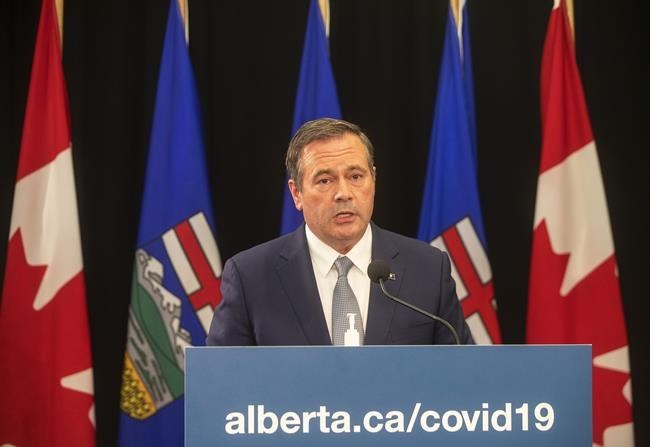CALGARY — Alberta Premier Jason Kenney faced down a restive and divided United Conservative Party caucus Wednesday, focusing on COVID-19 while managing to avoid a straw vote on his leadership.
UCP backbencher Searle Turton said it was a wide-ranging caucus meeting, but there was no vote of confidence on Kenney’s leadership.
He said the focus of the debate was the pandemic.
"There was discussion about the party, about unity, about how we got here, about COVID. Caucus is a robust place to do discussion in a confidential setting," said Turton, who represents Spruce Grove-Stony Plain.
"There were no votes by caucus. There was lots of robust discussion about the pandemic."
Kenney has been challenged by some of his legislature members for decisions on COVID, which has escalated into a crisis that has overwhelmed the provincial health system and forced Alberta to seek outside help.
Some of Kenney’s caucus members have criticized his health measures as being too little too late, while others say he has gone too far and violated individual rights by imposing a form of voluntary vaccine passports.
Joel Mullan, the party’s vice-president of policy, has already called for Kenney to resign and says enough constituency associations have signed on to force an early party review and vote on Kenney’s leadership.
Kenney isn't slated to face a mandatory leadership review until late next year.
But Mullan has said 30 constituency associations have promised to pass resolutions to call for an earlier review. If that happens, Kenney could face a vote by the membership in about three months and would lose the top job unless he wins at least a simple majority.
Kenney has dismissed accusations of party infighting and calls to resign, saying Tuesday he's focused on the COVID crisis.
Alberta has more than 20,000 active cases of COVID-19 and its critical care facilities have already been pushed well past normal capacity.
There were 1,040 people in hospital Wednesday with the illness, including 230 in intensive care. There were 20 more deaths reported, for a total of 2,594. The province also announced its first COVID-19 death of a person under 20.
Kenney’s government is looking to other provinces for critical care staff, particularly intensive care nurses and respiratory therapists. It is also working with the federal government to potentially have the military airlift some patients to other provinces.
Other medical procedures have virtually ground to a halt, with non-urgent surgeries cancelled to free up staff for COVID care. Doctors are being briefed on the criteria to use if resources run short and they must decide which critically ill patients get help and which do not.
The province has pinned its hopes on getting vaccination numbers up. Those numbers have improved since last Wednesday, when Kenney introduced a vaccine passport for non-essential businesses.
More than 81 per cent of eligible Albertans, those over age 12, are now fully vaccinated and almost 73 per cent of those eligible have had at least one shot.
Businesses that stick to the new passport can operate with almost no restrictions but must make sure patrons are double vaccinated.
Kenney's government has been criticized for leaving that decision up to businesses because it causes confusion and forces compliant businesses to face the wrath of anti-vaccination customers.
Other provinces have made it mandatory.
Calgary city council took matters into its own hands Wednesday, voting to make the passport — known in Alberta as a “restrictions exemption” — binding on non-essential businesses, with fines for violators. That new rule begins Thursday.
Elsewhere in Alberta, the passport is voluntary but non-essential businesses that do not comply face other restrictions, such as maximum one-third customer occupancy or, in the case of restaurants, outdoor seating only.
Also Wednesday, Alberta's Opposition NDP called for the reinstatement of contact tracing in schools and an early warning system for potential school closures.
NDP education critic Sarah Hoffman says action is needed immediately given that there are nearly 5,000 active cases among students, staff and families.
— With files from Dean Bennett in Edmonton
This report by The Canadian Press was first published Sept. 22, 2021.
Alanna Smith, The Canadian Press



